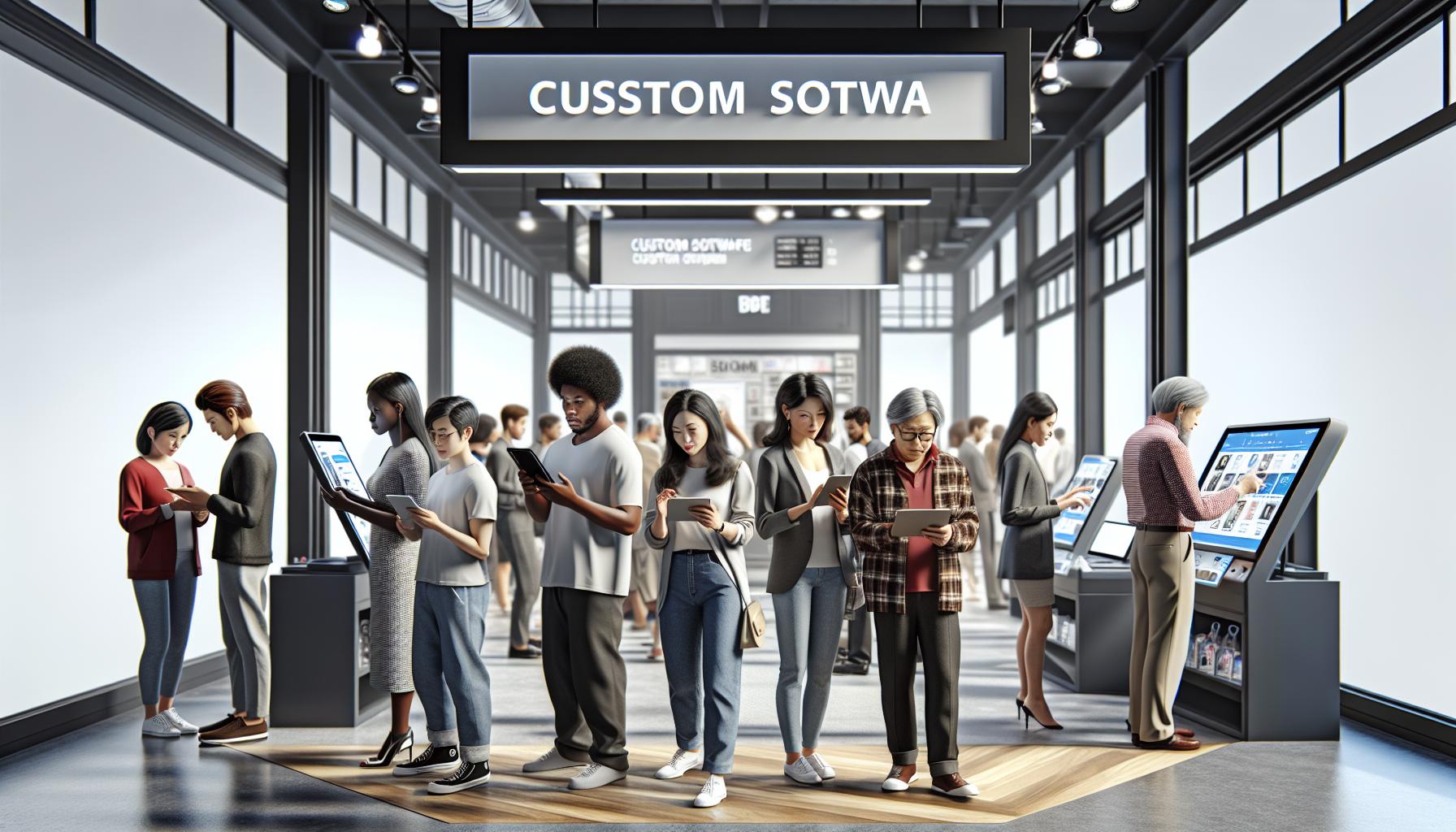In the fast-paced world of retail, standing out from the crowd is no small feat. Off-the-shelf software might get the job done, but why settle for ordinary when custom retail software development can turn your business into a lean, mean selling machine? Think of it as tailoring a suit—sure, you can grab one off the rack, but nothing beats that perfect fit that screams sophistication.
Custom solutions allow retailers to streamline operations, enhance customer experiences, and boost sales like never before. With the right software, businesses can automate tedious tasks, analyze data in real time, and adapt to market trends faster than you can say “checkout line.” So, if you’re ready to ditch the cookie-cutter approach and embrace a solution that’s as unique as your brand, it’s time to explore the exciting world of custom retail software development.
Custom Retail Software Development
Custom retail software development focuses on creating software solutions specifically tailored for the retail industry. Retailers confront unique challenges, including inventory management, customer engagement, and sales analytics. Custom solutions address these needs by providing features that align with specific business models and goals.
Seamless integration with existing systems often stands out as a critical advantage. Effective custom software allows retailers to combine their point of sale, inventory management, and e-commerce platforms into a unified system. Real-time data accessibility empowers retailers to make informed decisions, leading to enhanced operational efficiency.
Collaboration with software development teams enhances the end product. Developers and retailers work closely to identify requirements, ensuring the software matches user expectations. Flexibility in design allows for adjustments as business needs evolve over time. Custom software evolves alongside the business, accommodating new services or products as necessary.
Customer experience significantly improves through custom retail solutions. Personalized shopping experiences drive customer loyalty, and tailored interfaces facilitate easier navigation. Advanced analytics enable retailers to understand market trends and customer preferences, creating targeted promotions and offerings.
Investing in custom retail software often leads to long-term savings. While initial costs may appear higher than off-the-shelf options, the benefits accrued from tailored solutions outweigh those expenses. Ultimately, custom software development provides a strategic advantage for retailers, positioning them to thrive in a competitive market landscape.
Benefits of Custom Retail Software

Custom retail software offers numerous benefits for businesses looking to gain an edge in the competitive landscape. Retailers can tailor solutions to meet specific needs, enhancing their overall operations.
Enhanced Customer Experience
Custom software enhances the customer experience by providing personalized services. Retailers can analyze customer data effectively to tailor promotions and improve engagement. Specific features like loyalty programs foster stronger customer relationships. Shoppers appreciate seamless interactions across multiple channels, from in-store to online. Advanced analytics allow retailers to understand preferences and trends, leading to better-targeted marketing efforts. Overall, a customized approach translates to a more satisfying shopping experience, increasing customer loyalty and repeat business.
Improved Operational Efficiency
Operational efficiency improves significantly with custom retail software. Automation of routine tasks like inventory management and order processing frees employees to focus on strategic initiatives. Custom solutions integrate seamlessly with existing systems, creating a unified platform for data management. Real-time data access equips retailers to make informed decisions promptly. Additionally, tailored reporting features help pinpoint areas for improvement. Greater efficiency reduces operational costs, ultimately enhancing profitability. Custom software empowers retailers to adapt swiftly to changing market demands while optimizing resources.
Key Features of Custom Retail Software

Custom retail software encompasses essential features tailored for unique business needs, ensuring that retailers can effectively manage their operations and enhance customer experiences.
Inventory Management
Inventory management systems streamline stock tracking and ordering processes. Custom solutions offer real-time inventory visibility, enabling retailers to avoid stockouts and overstocks. Automatic updates on inventory levels reduce manual errors, allowing for smooth operations. Analytics tools provide insights into sales trends, facilitating data-driven reorder decisions. Custom alerts assist in maintaining optimal stock levels and assist with demand forecasting. Retailers can adjust to shifting market conditions quickly with these tailored features.
Point of Sale Integration
Point of sale integration offers seamless transactions and enhances customer interactions at checkout. Custom software connects all sales channels, unifying online and in-store operations. With accurate sales data available in real-time, businesses gain valuable insights into customer purchasing behavior. Streamlined payment processing simplifies transactions, improving customer satisfaction. Additionally, customized POS solutions can incorporate loyalty programs, fostering customer retention and engagement. Flexibility in payment options caters to diverse customer preferences, enhancing the overall shopping experience.
Choosing the Right Development Partner

Selecting a development partner for custom retail software is critical for success. It requires careful consideration of various factors to ensure alignment with business goals.
Evaluating Experience and Expertise
Experience plays a vital role in effective development. Seek partners with demonstrated success in retail software projects. Expertise in specific technologies enhances the ability to deliver high-quality solutions. Look for case studies showcasing previous work in similar environments. Proven knowledge of retail operations ensures a deep understanding of industry challenges. Additionally, a well-rounded team of developers and project managers strengthens the development process. Choosing a partner with relevant certifications can also signify their commitment to industry standards.
Assessing Communication and Support
Communication significantly affects project outcomes. Prioritize partners that emphasize clear, open lines of communication. Regular updates on progress help keep projects on track. Support structures should be robust, providing timely assistance for any issues. Assess the availability of team members during different time zones, considering global operations. Strong communication fosters collaboration and transparency, making it easier to adapt to changing requirements. Effective support after deployment ensures that the software continues to meet evolving business needs.
Cost Considerations in Custom Development
Assessing costs in custom retail software development involves various factors. Initial investments typically exceed those of off-the-shelf solutions. Development time often plays a significant role in the overall expense. Timelines can vary from several months to over a year, depending on the complexity of the project.
Labor costs represent another critical element in budgeting. Skilled developers with retail expertise generally command higher salaries. Geographical location influences these rates, with developers in urban areas typically charging more than those in rural regions.
Integration with existing systems incurs additional costs as well. Retrofitting custom software to work seamlessly with current tools often requires specialized skills. Retailers must factor in expenses related to software training and support, which may add to the initial budget.
Ongoing maintenance must also be accounted for. Regular updates, security patches, and feature enhancements require ongoing investment. Businesses should establish a clear plan for future software iterations to avoid unexpected costs.
Long-term savings can offset initial expenditures. Custom software’s ability to enhance efficiency often leads to lower operational costs. Tailored features can drive significant returns, enhancing customer loyalty and boosting sales.
Understanding the cost structure of custom software development supports informed decision-making. Budgeting includes balancing upfront investments with future benefits. Retailers must prioritize their needs and strategic goals to maximize returns on their custom software investment.
Right Development Partner
Investing in custom retail software development offers retailers a significant advantage in today’s fast-paced market. By tailoring solutions to specific needs, businesses can enhance operational efficiency and create more personalized customer experiences. This strategic approach not only streamlines processes but also fosters stronger customer relationships through improved engagement.
Choosing the right development partner is crucial for success. A knowledgeable team can ensure that the software evolves alongside business needs while providing ongoing support. Although the initial investment may be higher, the long-term benefits of custom solutions far outweigh the costs, leading to increased sales and customer loyalty. Retailers ready to embrace customization will find themselves better equipped to thrive in a competitive landscape.



